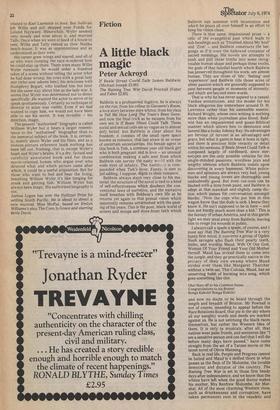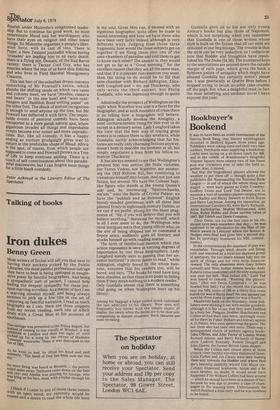A little black
magic Peter Ackroyd
If Beale Street Could Talk James Baldwin (Michael Joseph £3.00) The Raining Tree War David Pownall (Faber and Faber £2.95) Baldwin is a professional fugitive, he is always on the run; from his colour in Giovanni's Room, a love story between pure whites; from his class in Tell Me How Long The Train's Been Gone; and now the final trick as he escapes from his own sex in If Beale Street Could Talk. These social and sexual cells are so vague as to almost defy belief, but Baldwin is clear about his freedom: it consists of the small open space known as romance, that last straw in an ocean of uncertain uncertainties, His female agent in this book is Tish, a nineteen year old black girl who is both pregnant and in love — an unusual combination making a safe nest from which Baldwin can survey the nasty wo-ld with the wide eyes of infancy. The nastintr ;s is compounded when Tish's lover, Fonny, is sent to jail adding, I suppose, depth to their romance.
Baldwin always stays very close to his material; the structure of the novel is tied to a kind of self-reflectiveness which disobeys the conventional laws of narrative, and the narrative itself breathes with Baldwin's own life as he returns yet again to that primal vision which apparently remains untarnished with the passing of his years. This is the poor, black world of streets and stoops and store-front faith which Baldwin can summon with incantation and which he pours all over himself in an effort to keep his vision clean.
There is that same, impassioned prose — a relic of the evangelical past which leads to sub-headings such as 'Troubled About My Soul' and 'Zion' — and Baldwin constructs the language as if it were the hallowed container of sacred meanings. His novels are attempts to push and pull these truths into some recognisable human shape and perhaps these truths, the gods of that familial hearth which Baldwin has preserved throughout his work, are almost human. They are those of 'life', 'feeling' and 'experience' and Baldwin tills those acres of silent passion which are generally supposed to pass between people at moments of intensity, and which are beyond mere words.
That is why he has never aspired to a casual, Yankee mimeticism, and the model for his black allegories lies somewhere around D. H. Lawrence rather than his ostensible mentor, Richard Wright, whose own writing is nothing more than white journalism plus blood. Baldwin has an impassioned and quasi-Biblical manner which allows him to denounce and lament like a funky Johnny Ray. Its advantages are fervour (if fervour is an advantage) and grace, but what it gains in heat it loses in light, and there is precious little veracity or detail within his sermons. If Beale Street Could Talk is composed largely of cardboard, since stereotypes are the only possible vehicles for the single-minded passions, wordless joys and lengthy silences which Baldwin insists upon discovering in every basement. White policemen and spinsters are always very bad, young blacks and young lovers are thoroughly and undoubtedly good. But even cut-outs can be daubed with a little fresh paint, and Baldwin is adept at that mawkish and slightly camp diction which passes for conversation amongst blacks: "Now the cops who put him in this wagon know that the dude is sick. I know they know it. He ain't supposed to be in here — and him not hardly much more than a kid." This is the fantasy of urban America, and in this garish light we may steal away from Baldwin, leaving him to rouge his wounds in public. I always call a spade a spade, of course, and I must say that The Raining Tree War is a very funny first novel. It concerns a group of Ogden Nash savages who flash their pearly teeth, limbo, and worship Maud, Wife Of Our God, Woman Of Your Friend and Your Old Mother Herself. Maud has invited them to come into the jungle, and they go practically native in the privacy of their own swamp where Maud strides over them like Margaret Thatcher without a twin-set. This Colossa, Maud, has an unnerving habit of bursting into song, which goes something like this
Oho! Hats off to his Connnon Sense, Congratulations to his Brains! Bonga Kakulu! Bonga Kakulu!
and now no doubt to be heard through the length and breadth of Brixton. Mr Pownall is not of course, intending to appear before the Race Relations Board, that pie in the sky where all our naughty words and deeds are marked against us. He is not satirising the black races themselves, but rather the Western Idea of them. It is only in musicals, after all, that natives wear palm fronds, and sentences like "I am a sensitive person and can feel that I will die before many days have passed," have come straight from the set of a Tarzan movie or the latest novel of Olivia Manning.
Back in real life, People and Progress cannot be halted and Maud is a deified thorn in what passes as the flesh of Dr Mulombe, the lovable democrat and dictator of the country. The Raining Tree War is set in those first heady days after independence, and we know that the whites have left when the good doctor makes his mother, Mrs Renfrew Mulombe, Air Marshal. All of the most charming Western vices, such as drunkenness and corruption, have taken permanent root in the republic and
flourish under Mulombe's enlightened leadership. But to continue his good work, he must exterminate Maud and her worshippers who have their eyes on religion and other lower things. So Mulombe organises a people's liberation force, vvith its cast of tens. There is PYper, a New Zealand journalist whose boring 'crusades' are leading him to an early death; there is a flying ace, Dessaix, of the Red Baron variety; there is Tarzan Cool Guy, who has muscles where the rest of us have skin follicles and who lives in Field Marshal Montgomery Crescent.
This last hint of the suburban dream conveys something of Mr Pownall's satire, which plumbs the shifting sands on which two races and cultures meet; we have "mealies, cassava and beans" in the one bowl and "wire coathangers and Basildon Bond writing paper" on the other foot. The shock of mutual recognition is enough to send anyone up the tree, but Mr Pownall has deflected it with farce. The improbable events of pastoral comedy have been transported to a more garish natural spot, where gigantism invades all things and improbable events become ever noiser and more unpredictable. But, like all comedy, it has a happy ending as nurture grudgingly gives way to nature in the irrefutable shape of Maud. Africa is the spot, of course, from which people are supposed to come and Pownall throws in a Tree of Life to keep everyone smiling. There is a touch of self-consciousness about this paradisaiaal manoeuvre, but I can forgive most things for a little black comdedy.
Peter Ackroyd is the Literary Editor of The Spectator.



































 Previous page
Previous page